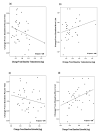Characterization of verbal and spatial memory changes from moderate to supraphysiological increases in serum testosterone in healthy older men
- PMID: 17145137
- PMCID: PMC1864939
- DOI: 10.1016/j.psyneuen.2006.10.008
Characterization of verbal and spatial memory changes from moderate to supraphysiological increases in serum testosterone in healthy older men
Abstract
Background: It has been suggested that cognitive changes in response to T supplementation may occur within an ideal range. The objective of this study was to compare the cognitive responses of older, eugonadal men in whom moderate or large increases in serum testosterone levels was induced by exogenous testosterone supplementation.
Design: Randomized, double-blind, placebo-controlled study with subsequent grouping of participants according to average increase in circulating T from baseline.
Setting: Community dwelling participants.
Participants: Fifty-seven healthy, eugonadal, community dwelling male volunteers, mean age 67 years (+/-11 years).
Interventions: Participants were randomized to receive weekly intramuscular (i.m.) injections of either 50, 100 or 300 mg T enanthate or placebo (saline) injection for 6 weeks. Cognitive evaluations using a battery of neuropsychological tests were conducted at baseline, weeks 3 and 6 of treatment and after 6 weeks of wash-out.
Main outcome measures: Performance on cognitive tests of verbal and spatial memory.
Results: Men with moderate increases in serum T and/or its metabolites demonstrated significant improvements in verbal and spatial memory. In contrast, men with large or low increases in circulating T levels, failed to demonstrate significant changes in memory.
Conclusion: These results suggest that in healthy older men, beneficial changes in cognitive function induced by T supplementation are most evident with moderate changes in cognition from moderate to high T supplementation increases in T levels. Large or no to low increases in T levels do not appear to appreciably effect cognition.
Figures


References
-
- Alexander GM, Swerdloff RS, Wang C, Davidson T, McDonald V, Steiner B, Hines M. Androgen-behavior correlations in hypogonadal men and eugonadal men. II. Cognitive abilities. Horm Behav. 1998;33(2):85–94. - PubMed
-
- Barrett-Connor E, Goodman-Gruen D, Patay B. Endogenous sex hormones and cognitive function in older men. J Clin Endocrinol Metab. 1999;84(10):3681–5. - PubMed
-
- Basaria S, Dobs AS. Risks versus benefits of testosterone therapy in elderly men. Drugs Aging. 1999;15(2):131–42. - PubMed
-
- Bhasin S, Woodhouse L, Casaburi R, Singh AB, Bhasin D, Berman N, Chen X, Yarasheski KE, Magliano L, Dzekov C, Dzekov J, Bross R, Phillips J, Sinha-Hikim I, Shen R, Storer TW. Testosterone dose-response relationships in healthy young men. Am J Physiol Endocrinol Metab. 2001;281(6):E1172–81. - PubMed
-
- Cherrier MM, Anawalt BD, Herbst JK, Amory JK, Craft S, Matsumoto A, Bremner WJ. Cognitive Effects of Short Term Manipulation of Serum Sex Steroids in Healthy Young Men. Journal of Clinical Endocrinology and Metabolism. 2002;87:3090–3096. - PubMed
Publication types
MeSH terms
Substances
Grants and funding
LinkOut - more resources
Full Text Sources
Medical

